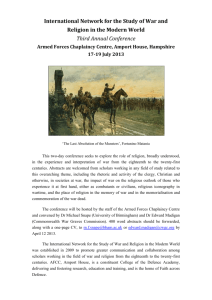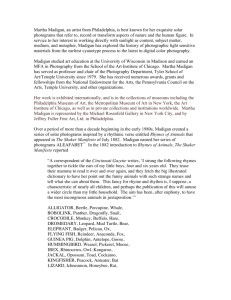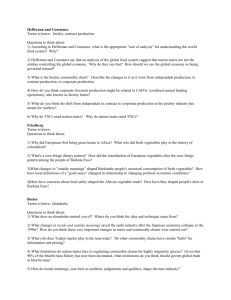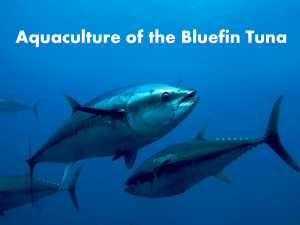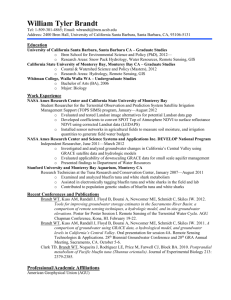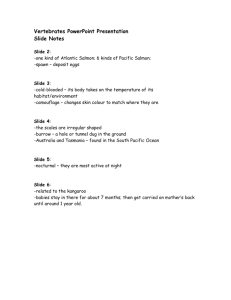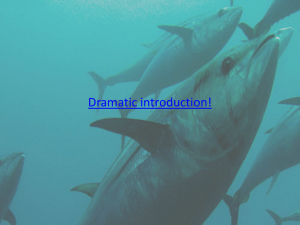My PhD work at Hopkins used various chemical tracers, including
advertisement
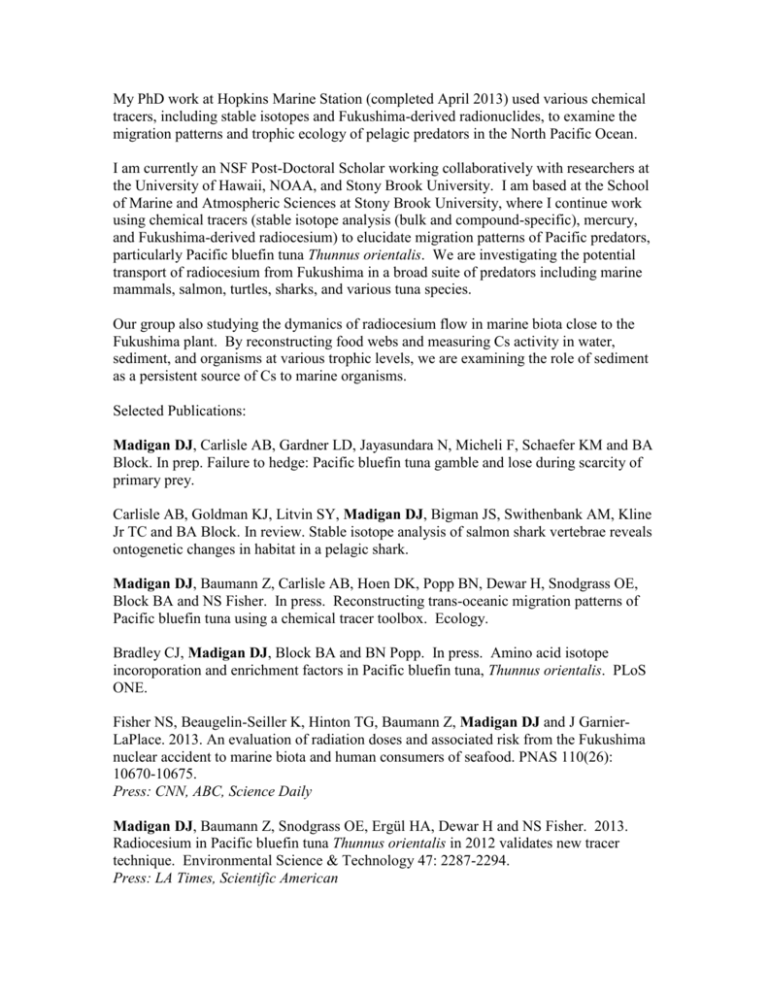
My PhD work at Hopkins Marine Station (completed April 2013) used various chemical tracers, including stable isotopes and Fukushima-derived radionuclides, to examine the migration patterns and trophic ecology of pelagic predators in the North Pacific Ocean. I am currently an NSF Post-Doctoral Scholar working collaboratively with researchers at the University of Hawaii, NOAA, and Stony Brook University. I am based at the School of Marine and Atmospheric Sciences at Stony Brook University, where I continue work using chemical tracers (stable isotope analysis (bulk and compound-specific), mercury, and Fukushima-derived radiocesium) to elucidate migration patterns of Pacific predators, particularly Pacific bluefin tuna Thunnus orientalis. We are investigating the potential transport of radiocesium from Fukushima in a broad suite of predators including marine mammals, salmon, turtles, sharks, and various tuna species. Our group also studying the dymanics of radiocesium flow in marine biota close to the Fukushima plant. By reconstructing food webs and measuring Cs activity in water, sediment, and organisms at various trophic levels, we are examining the role of sediment as a persistent source of Cs to marine organisms. Selected Publications: Madigan DJ, Carlisle AB, Gardner LD, Jayasundara N, Micheli F, Schaefer KM and BA Block. In prep. Failure to hedge: Pacific bluefin tuna gamble and lose during scarcity of primary prey. Carlisle AB, Goldman KJ, Litvin SY, Madigan DJ, Bigman JS, Swithenbank AM, Kline Jr TC and BA Block. In review. Stable isotope analysis of salmon shark vertebrae reveals ontogenetic changes in habitat in a pelagic shark. Madigan DJ, Baumann Z, Carlisle AB, Hoen DK, Popp BN, Dewar H, Snodgrass OE, Block BA and NS Fisher. In press. Reconstructing trans-oceanic migration patterns of Pacific bluefin tuna using a chemical tracer toolbox. Ecology. Bradley CJ, Madigan DJ, Block BA and BN Popp. In press. Amino acid isotope incoroporation and enrichment factors in Pacific bluefin tuna, Thunnus orientalis. PLoS ONE. Fisher NS, Beaugelin-Seiller K, Hinton TG, Baumann Z, Madigan DJ and J GarnierLaPlace. 2013. An evaluation of radiation doses and associated risk from the Fukushima nuclear accident to marine biota and human consumers of seafood. PNAS 110(26): 10670-10675. Press: CNN, ABC, Science Daily Madigan DJ, Baumann Z, Snodgrass OE, Ergül HA, Dewar H and NS Fisher. 2013. Radiocesium in Pacific bluefin tuna Thunnus orientalis in 2012 validates new tracer technique. Environmental Science & Technology 47: 2287-2294. Press: LA Times, Scientific American Madigan DJ, Litvin SY, Popp BN, Carlisle AB, Farwell CJ and BA Block. 2012. Turnover rates and fractionation of carbon and nitrogen isotopes in an endothermic teleost, Pacific bluefin tuna (Thunnus orientalis). PLoS ONE 7 (11), e49220. Madigan DJ, Carlisle AB, Dewar H, Snodgrass OE, Litvin SY, Micheli F and BA Block. 2012. Stable isotope analysis challenges wasp-waist food web assumptions in an upwelling pelagic ecosystem. Scientific Reports 2:654. Madigan DJ, Baumann Z and NS Fisher. 2012. Pacific bluefin tuna transport Fukushima-derived radionuclides from Japan to California. PNAS 109(24), 9483-9486. Press: Nature, Scientific American, Wall Street Journal, Forbes, LA Times, Washington Post, Associated Press, CNN Carlisle AB, Kim SL, Semmens BX, Madigan DJ, Jorgensen SJ, Perle CR, Anderson SD, Chapple TK, Kanive PE and BA Block. 2012. Using stable isotope analysis to understand migration and trophic ecology of northeastern Pacific white sharks (Carcharodon carcharias). PloS One (7) 2: e30492. Burge EJ, Madigan DJ, Burnett LE and KG Burnett. 2007. Lysozyme gene expression by hemocytes in Pacific white shrimp, Litopenaeus vannamei, after injection with Vibrio. Fish and Shellfish Immunology 22(4): 327-339.

